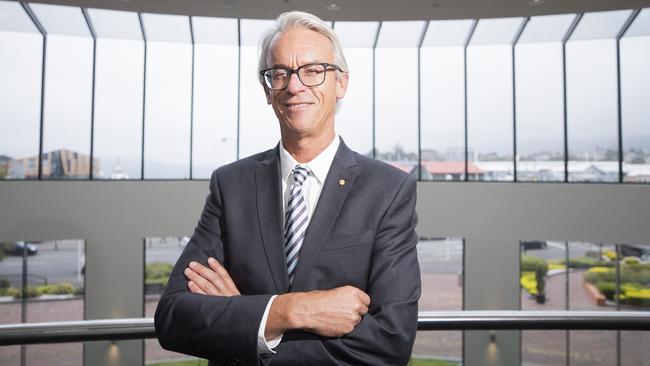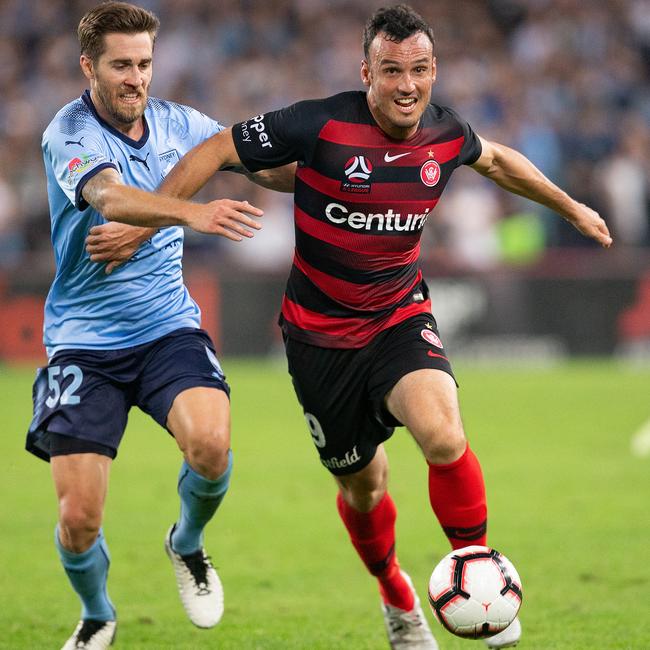Gallop’s fate sealed after Lowy departure
Gallop was a marked man as soon as Steven Lowy announced he was stepping down from his role last August.

David Gallop was a marked man as soon as then Football Federation Australia chairman Steven Lowy announced he was stepping down from his role last August.
Gallop, who yesterday revealed he would quit as FFA chief executive in December, had been headhunted by Lowy’s billionaire father and then soccer chairman Frank on the sidelines of the London Olympics in 2012, shortly after he had left rugby league.
The ex-NRL chief executive was welcomed with open arms to the round ball code as a highly credentialled and respected sports boss with good links into both the broadcast and corporate worlds.
But the end of the Lowys’ involvement in soccer was the beginning of the end for Gallop, whose reputation took a hit with the sacking of Matildas coach Alen Stajcic earlier this year.
The termination of a coach on the eve of a World Cup sparked months of squabbling in a sport that has done its fair share of infighting and ultimately led to an apology from FFA director Heather Reid to Stajcic for public comments that were later withdrawn.
Then there was the A-League club owners finally achieving success in their long-running war against FFA, first by outing the younger Lowy and then last week striking an agreement for the league to become independent of the governing body.
To mark his resignation, Gallop yesterday released a statement that served as both a warning and a signal of hope for the future.
“There are challenges given the expectations that are created by the global mirror that is held up to the game in this country’s competitive sporting landscape, but enormous growth opportunities are available if the stakeholders are united,” he said. “My aim is to ensure there is a seamless transition, with minimal interruption to the good work of the very many people … who work so hard to deliver on the game’s extensive agenda.”
Gallop touched on the still outstanding bid for the 2023 Women’s World Cup as a major issue for the code but he also pointed out that without oversight of the A-League, the chief executive role as it currently existed “would be a very different, narrower role”.
He will leave FFA after seven years, a relatively long tenure for a chief executive in either the business or sporting world, and any honest reading of his time will show a mixed legacy.
Call it the administrative version of a match ending in a 2-2 draw — but after being ahead 2-0 only to give up two late goals and have the game lurch into the uncertainty of a penalty shootout.

Gallop’s FFA stint began well as the sport tried to move forward from the World Cup bidding scandal that saw Australia lose out to Qatar for the 2022 event, a process that damaged the elder Lowy’s reputation.
The A-League’s popularity grew as star imports such as Sydney FC’s Alessandro Del Piero graced the competition and the upstart Western Sydney Wanderers won the Asian Champions League in 2014.
Gallop also hired Ange Postecoglou as Socceroos coach, replacing German Holger Osieck and overseeing an overhaul of the national team’s tactical nous. The Postecoglou era would peak with the winning of the 2015 Asian Cup on home turf, a tournament to which crowds flocked to sold-out stadiums across much of the country.
The FFA Cup would be introduced, providing a much-needed link between the professional and semi-professional clubs underneath the A-League, and superstar Tim Cahill would return from a glittering career in England to play for Melbourne City.
But Gallop’s star would diminish with the handling of the banning of almost 200 fans of A-League clubs in late 2015 in a bid to root out anti-social behaviour among the otherwise mainly boisterous “active fan” groups.
A co-ordinated fan boycott of stadiums would follow and the incident would prove to be a turning point for Gallop with soccer fans. They grew uneasy at him not being a “football person” — Gallop was a cricket player and lawyer before running rugby league — and his popularity slipped.
There were other highlights, including a record six-year $346 million broadcast deal with Fox Sports struck in late 2016 and there is now more money in soccer than there has ever been in the code’s history in Australia.
Gallop said in his statement he was also satisfied that he had overseen a strengthening of the financial aspects of women’s football, but did not mention that came after the Matildas national women’s team went on strike in 2015 over their wages.
Then there was the botched sacking of Stajcic, another black mark in the eye of soccer fans, as was the surprise departure of Postecoglou on the eve of the 2018 World Cup after the Socceroos struggled during qualification.
The question now, as the sport turns inward and almost certainly looks for a “football person” to replace Gallop, is can it find anyone better to lead the code into an uncertain new era?




To join the conversation, please log in. Don't have an account? Register
Join the conversation, you are commenting as Logout